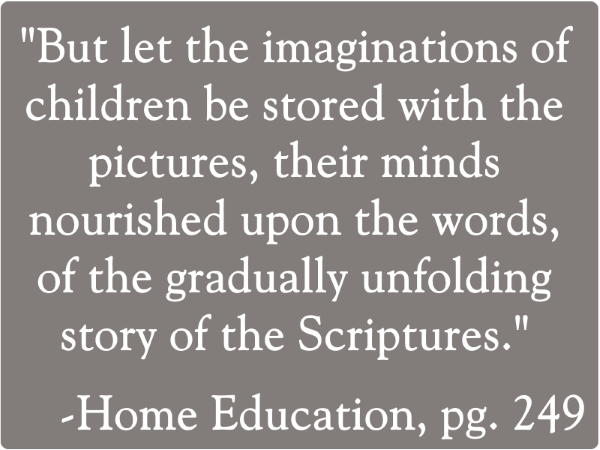
Charlotte Mason insisted the teacher not take a “front and center” role, warned against the “talky-talky” teacher, etc. This episode addresses when it is appropriate for the teacher to explain, question, and even present the “oral lesson.”
Listen Now:

“When a child is reading, he should not be teased with questions as to the meaning of what he has read, the signification of this word or that; what is annoying to older people is equally annoying to children…He enjoys this sort of consecutive reproduction, but abominates every question in the nature of a riddle. If there must be riddles, let it be his to ask and the teacher’s to direct him to the answer.” (1/228)
“Of the means we employ to hinder the growth of mind perhaps none is more subtle than the questionnaire. It is as though one required a child to produce for inspection at its various stages of assimilation the food he consumed for his dinner ; we see at once how the digestive processes would be hindered , how, in a word, the child would cease to be fed. But the mind also requires its food and leave to carry on those quiet processes of digestion and assimilation which it must accomplish for itself. The child with capacity, which implies depth, is stupified by a long rigmarole on the lines of,-‘If John’s father is Tom’s son, what relation is Tom to John?’ The shallow child guesses the riddle and scores; and it is by the use of tests of this kind that we turn out young people sharp as needles but with no power of reflection, no intelligent interests, nothing but the aptness of the city gamin.” (6/54-55)
“…the teaching one hears and sees is more or less obtrusive. The oral lesson and the lecture, with their accompanying notes, give very little scope for the establishment of relations with great minds and various minds. The child who learns his science from a text-book, though he go to Nature for illustrations, and he who gets his information from object-lessons, has no chance of forming relations with things as they are, because his kindly obtrusive teacher makes him believe that to know about things is the same thing as knowing them personally ; though every child knows that to know about Prince Edward is by no means the same thing as knowing the boy-prince. We study in many ways the art of standing aside.” (3/66)
“…we believe intellectual spoon-meat to be the only food for what we are pleased to call ‘ little minds .'” (3/171)
“…an inspiring idea initiates a new habit of thought, and hence, a new habit of life; we perceive that the great work of education is to inspire children with vitalising ideas as to every relation of life, every department of knowledge, every subject of thought; and to give deliberate care to the formation of those habits of the good life which are the outcome of vitalising ideas.” (3/173)
“The oral lesson, which at its worst is very poor twaddle, and at its best is far below the ordered treatment of the same subject by an original mind in the right book…The lecture, commonly gathered from various books in rapid notes by the teacher ; and issuing in hasty notes, afterwards written out, and finally crammed up by the pupils. The lecture is often careful, thorough, and well-illustrated; but is it ever equal in educational value to direct contact with the original mind of one able thinker who has written his book on the subject?” (3/242)
“Though the part of the teacher should, in a general way, be that of the University tutor who “reads with” his men, the oral lesson, also, is indispensable, whether in introducing a course of reading or as bringing certain readings to a point. Oral lessons, too, give the teacher opportunities for the reading of passages from various books bearing on the subject in hand, a sure way to increase the desire of the children for extended knowledge. Some subjects, again, as Languages, Mathematics, Science, depend very largely upon oral teaching and demonstrations. It might be well if the lecture, with its accompaniments of note-taking and reports, were cut out of the ordinary curriculum, and the oral lesson made a channel for free intellectual sympathy between teacher and taught, and a means of widening the intellectual horizon of children.” (3/328-329)
“Thus it becomes a large part of the teacher’s work to help children to deal with their books; so that the oral lesson and lecture are but small matters m education, and are used chiefly to summarise or to expand or illustrate.” (3/226)







